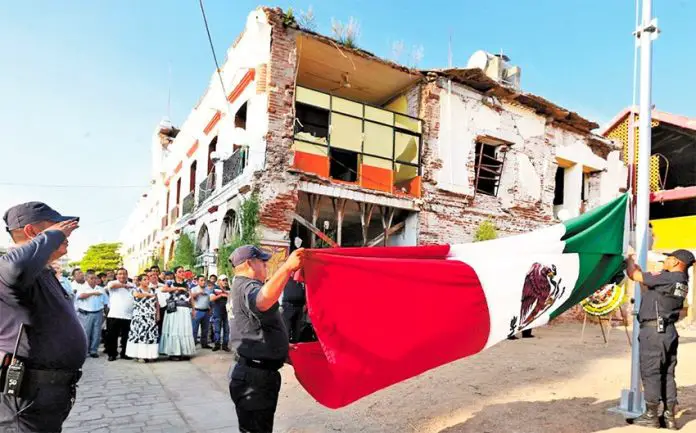A year after the powerful earthquake that devastated parts of southern Mexico, the mayor of one of the hardest hit towns said yesterday that the situation remains “critical” and called on the federal government to allocate more funding to reconstruction.
At a ceremony in Juchitán, Oaxaca, to mark the first anniversary of the 8.2-magnitude September 7 earthquake, Mayor Gloria Sánchez said that many parts of the state are still a long way from recovering from the natural disaster.
She also said that 5,200 families who were classified as quake victims in a census conducted in March haven’t received federal financial aid, and that 280 million pesos (US $14.5 million) in additional housing funding allocated to Oaxaca by the Interior Secretariat isn’t enough considering the widespread nature of the damage.
“We’re calling for the amount granted to each family to build a decent home to be increased, and for a comprehensive plan to be made for the reconstruction of Juchitán; one that considers housing, schools, businesses, public buildings and urban infrastructure,” Sánchez said.
In the aftermath of the September 7 and September 19 earthquakes, people whose homes sustained total damage were allocated 120,000 pesos in financial aid in a combination of cash and stored-value bank cards.
However, in addition to claims that some people missed out on the aid they were entitled to, the scheme faced a range of other problems.
After waiting two months to receive aid, some victims found in November that their cards had apparently been cloned and didn’t contain any funds, while earlier this week Sánchez said that municipal authorities have received complaints from 200 Juchitán residents who said that they handed over their aid to unscrupulous construction companies who took their money and ran.
There have also been claims that some officials have placed conditions on receiving government aid.
Sánchez urged president-elect Andrés Manuel López Obrador to consider the possibility of conducting a new census to give quake victims the opportunity to report their current situations.
In an earlier radio interview, the mayor said that some residents of Juchitán have been unable to repair or rebuild their damaged or collapsed homes in the year since the earthquake struck and as a result continue to face precarious living conditions.
“The situation is critical. There are people who still don’t have a roof over their heads, people who live in waste water because 80% of the drainage system is collapsed and there is no comprehensive reconstruction plan,” Sánchez said.
“Our infrastructure is a wreck . . . There’s sewage spurting out everywhere,” she said in a separate interview with the news agency AFP.
The mayor’s call for a new damage census was echoed yesterday by newly-elected federal senators from Morena, the leftist party led by López Obrador that dominated the July 1 elections.
Oaxaca Senator Susana Harp said there are at least 50,000 victims in the state who haven’t received any form of government aid.
In contrast, Agrarian Development and Urban Planning Secretary Rosario Robles declared yesterday that 97% of quake-affected families in both Oaxaca and Chiapas have received federal aid.
However, thousands of people in both states are still waiting for reconstruction or repair work on their homes to be completed or, in some cases, to begin, while many more found that the aid they received was woefully inadequate to meet their needs.
The earthquake, which struck at 11:49pm with an epicenter off the coast of Chiapas, claimed the lives of 98 people and damaged thousands of homes and buildings including key infrastructure such as hospitals and schools.
Source: El Universal (sp), Milenio (sp)
